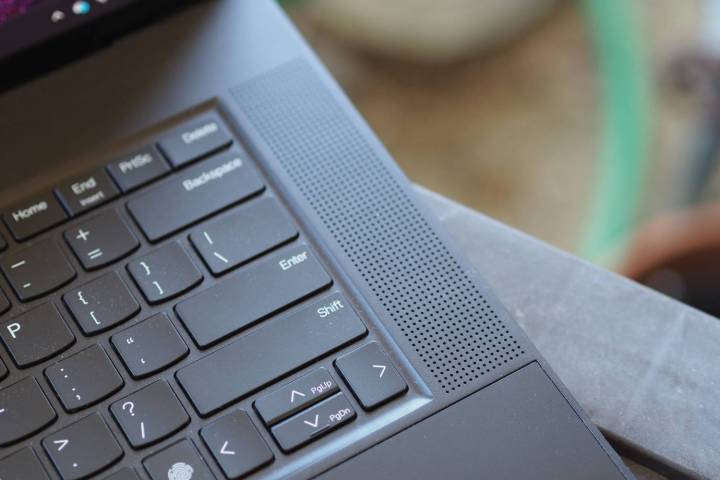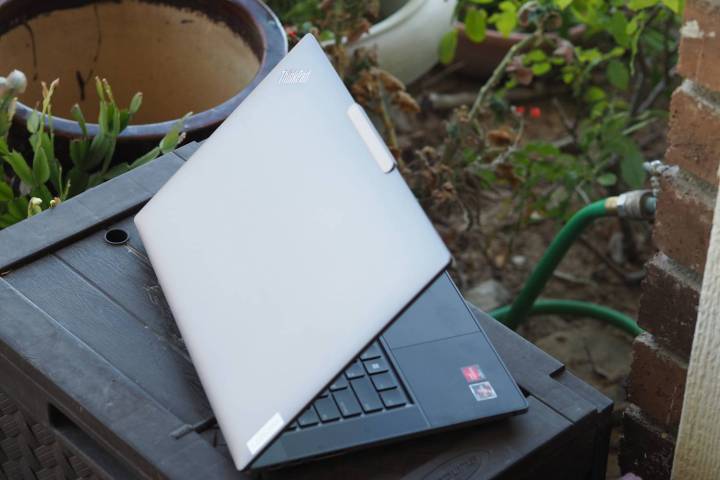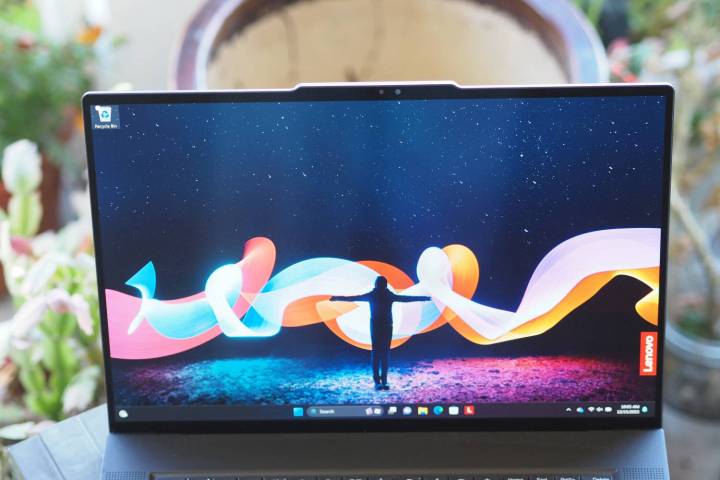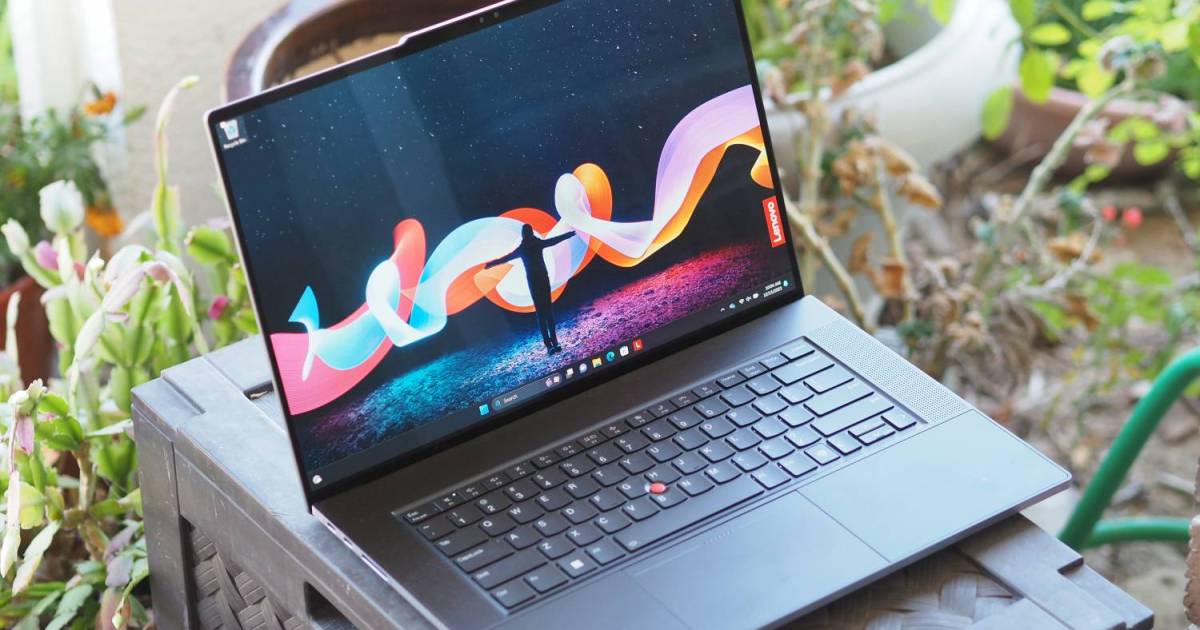Lenovo ThinkPad Z16 Gen 2
MSRP $2,680.00
“The Lenovo ThinkPad Z16 Gen 2 has become less modern than it first appeared.”
Pros
- Solid build quality
- Good productivity performance
- Relatively thin and light
- Good keyboard
- Attractive aesthetic
- Beautiful OLED display
- Lots of ports
Cons
- Slippery palm rest
- Quirky touchpad
- Slow creativity performance
- Below-average battery life
- Display is only 60Hz
Lenovo shook up the ThinkPad lineup with the ThinkPad Z16, a more modern take on the venerable classic. When the first generation arrived, I found it to be a great new addition to the family, offering contemporary styling to go with the usual ThinkPad quality and toughness.
The second generation is now here, and it updates the CPU and GPU while keeping everything else the same. IT departments will like it, but it’s not quite as much of a standout laptop compared to the wide range of 16-inch competitors in late 2023.
Specs and configurations
| Lenovo ThinkPad Z16 Gen 2 | |
| Dimensions | 13.95 x 9.35 x 0.62 inches |
| Weight | 3.99 pounds |
| Processor | AMD Ryzen 5 Pro 7640HS AMD Ryzen 7 Pro 7840HS AMD Ryzen 9 Pro 7940HS |
| Graphics | AMD Radeon Graphics AMD Radeon RX 6550M |
| RAM | 16GB 32GB 64GB |
| Display | 16.0-inch 16:10 WUXGA (1,920 x 1,200) IPS, 60Hz 16.0-inch 16:10 WQUXGA (3,840 x 2,400) OLED, 60Hz |
| Storage | 512GB 1TB SSD 2TB SSD |
| Touch | No |
| Ports | 2 x USB-C USB4 1 x USB-A 3.2 Gen 2 1 x USB-A 3.2 Gen 1 1 x HDMI 2.1 1 x 3.5mm audio jack 1 x microSD card reader |
| Wireless | Wi-Fi 6E and Bluetooth 5.3 |
| Webcam | 1080p with infrared camera for Windows 11 facial recognition |
| Operating system | Windows 11 |
| Battery | 72 watt-hours |
| Price |
$1,588+ |
As usual, Lenovo offers a slew of configuration options for the ThinkPad Z16 Gen 2, and its price changes regularly. As this review is being written, the entry-level machine costs $1,588 for an AMD Ryzen 5 Pro 7640HS CPU, 16GB of RAM, at 512GB SSD, a 16.0-inch WUXGA IPS display, and integrated AMD Radeon graphics. The most you’ll spend is $3,210 for a Ryzen 9 Pro 7940HS, 64GB of RAM, a 2TB SSD, a 16.0-inch WUXGA OLED display, and an AMD Radeon RX 6550M GPU. My review unit is priced at $2,680 with the same high-end components except for a 1TB SSD.
That makes the ThinkPad Z16 Gen 2 a distinctly premium laptop and quite expensive when fully configured. The Dell XPS 15 is equally as expensive, although for around $3,200, you get a faster CPU and GPU with Dell’s machine.
The same modern take on the ThinkPad design

The ThinkPad Z16 Gen 2 takes on the same design as its predecessor, which introduced a more modern look to the ThinkPad lineup. It’s sleeker than the Lenovo ThinkPad X1 Carbon with its more old-school aesthetic, and instead opts for a less angular and more elegant look that’s reminiscent of the Apple MacBook Pro. The lid is dark gray and the chassis edges are chrome, while the palm rest and keyboard retain the lineup’s iconic black-on-black color scheme. It’s still recognizable as a ThinkPad, but I find it quite a bit more attractive.
The display bezels are slim, giving the ThinkPad Z16 Gen 2 a modern appearance. Lenovo utilized its reverse notch to fit in the 1080p webcam and infrared camera for Windows 11 Hello facial recognition. I find that a more reasonable approach than Apple’s display notch, and there’s also something to grip when opening the lid – which can be done with one hand thanks to the smooth hinge that holds the display firmly in place.
The aluminum chassis and lid are rigid and subjected to military-grade tests for robustness. The MacBook Pro still feels more solid, but nobody can complain about the ThinkPad Z16 Gen 2’s build quality. The ThinkPad is thin at 0.62 inches and light at 3.99 pounds, both excellent numbers for a 16-inch laptop.
The keyboard is very ThinkPad-like with its sculpted keycaps boasting substantial travel. I found the switches lighter than on some ThinkPads, which I appreciated. I don’t like stiff keyboards. The keycap size and spacing are both excellent, and unlike on some other ThinkPads, the Ctrl and Fn keys aren’t reversed. That, too, makes better sense to me.

The haptic touchpad was smaller than on the MacBook Pro 16, with more space above the keyboard, and I found it slightly less comfortable to use. The ThinkPad Z16 Gen 2’s touchpad would sometimes hold onto virtual clicks too long, causing me to inadvertently move the mouse cursor, whereas Apple’s version is more precise. Perhaps that’s something Lenovo can fix with a firmware update. If you prefer Lenovo’s TrackPoint nubbin, you’ll find it in the middle of the keyboard. It works as well as always.
One complaint I had while using the ThinkPad Z16 Gen 2 to type this review copy was that the palm rest was ridiculously smooth. My wrists slid all over while I was typing, and I had to make a conscious effort to keep my fingers positioned on the keys. It slowed me down, and I can’t remember another laptop where I had the same complaint.
Connectivity is good, with both modern and legacy ports. I would have preferred a full-size SD Card reader, and there’s no Thunderbolt 4 because of the AMD chipset. Wireless connectivity is up to date.
In addition to facial recognition, you can use the fingerprint reader on the keyboard to log in without a password. Both options were fast and reliable. The ThinkPad Z16 Gen 2 retains the usual ThinkPad security features such as a match-on-chip sensor in the fingerprint reader and a self-healing BIOS that can recover the machine in the case of a malicious attack. The ThinkPad Z16 Gen 2 offers an AMD Ryzen Pro processor that can plug into enterprise security and management systems.
A little faster, a lot less long-lasting

The ThinkPad Z16 Gen 2 uses AMD Ryzen Pro 7040 CPUs, which are aimed at organizations that can utilize their enhanced security and manageability features. In terms of performance, they’re equal to their non-Pro siblings, and I reviewed the ThinkPad with the Ryzen 9 Pro 7940HS. That’s an 8-core/16-thread CPU running at up to 5.2GHz and drawing between 35 watts and 54 watts. It should compete most directly with Intel’s 45-watt Core processors. My review unit also included the entry-level AMD Radeon RX 6550M discrete GPU.
In our suite of performance tests, the ThinkPad’s performance was mixed. It scored very low in Geekbench 5, well below the Ryzen 9 7940HS in the Acer Swift X 16 and the Core i7-13700H and Core i9-13900H. It managed a stronger score in our Handbrake test that encodes a 420MB video as H.265, as well as in the Cinebench R23 benchmark. Lenovo integrates its performance management functionality into the Windows performance slider, and I saw minimal impact when switching to performance mode. The fans did get a bit louder, but the performance was almost the same. The chassis and keyboard never got more than warm during benchmarking.
The ThinkPad Z16 Gen 2 wasn’t as quick as the comparison group in the PugetBench Premiere Pro benchmark, which runs in a live version of Adobe’s Premiere Pro and uses discrete GPUs to speed up various tasks. That’s likely down to the Radeon RX 6550M GPU, which was slower than the Nvidia GeForce RTX GPUs. According to the 3DMark Time Spy test, the RX 6550M falls in the middle between Intel integrated Iris Xe graphics and the entry-level RTX 4050.
These results make the ThinkPad Z16 Gen 2 a fast enough machine to handle demanding productivity tasks, but not fast enough for anything more than minimal creativity workflows. If you’re a creator, you’ll want to consider a 16-inch laptop with a faster combination of CPU and GPU. Gamers who want to run modern titles will also need to look elsewhere.
| Geekbench (single/multi) |
Handbrake (seconds) |
Cinebench R23 (single/multi) |
PugetBench Premiere Pro |
|
| Lenovo ThinkPad Z16 Gen 2 (Ryzen 9 PRO 7940HS/RX 6550M) |
Bal: 1,144 / 8,241 Perf: 1,362 / 8,064 |
Bal: 72 Perf: 75 |
Bal: 1,735 / 14,642 Perf: 1,762 / 15,446 |
Bal: 377 Perf: 389 |
| Lenovo ThinkPad Z16 (Ryzen 7 PRO 6850H/RX 6500M) |
Bal: 1,360 / 8,648 Perf: 1,365 / 8,679 |
Bal: 88 Perf: 67 |
Bal: 1,509 / 11,578 Perf: 1,806 / 13,313 |
N/A |
| Acer Swift X 16 (Ryzen 9 7940HS/RTX 4050) |
Bal: 1,840 / 11,741 Perf: 1,893 / 11,681 |
Bal: 64 Perf: 64 |
Bal: 1,793 / 16,407 Perf: 1,799 / 16,760 |
Bal: 567 Perf: 568 |
| HP Envy 16 (2023) (Core i9-13900H/RTX 4060) |
Bal: 1,997 / 12,742 Perf: 1,992 / 12,645 |
Bal: 73 Perf: 75 |
Bal: 1,944 / 15,596 Perf: 1,954 / 15,422 |
Bal: 544 Perf: 608 |
| Dell XPS 15 (9530) (Core i7-13700H/RTX 4070) |
Bal: 1,787 / 11,978 Perf: 1,830 / 11,769 |
Bal: 79 Perf: 76 |
Bal: 1,865 / 13,386 Perf: 1,868 / 13,927 |
N/A |
| Apple MacBook Pro 14 (M3 Max) |
N/A | Bal: 53 Perf: N/A |
Bal: 1,881 / 22,028 Perf: 1,883 / 23,417 |
Bal: 889 Perf: N/A |
I reviewed the first-gen ThinkPad Z16 with the previous-generation AMD Ryzen 7 Pro 6850H CPU and a low-power 1,920 x 1,200 IPS non-touch display, and it achieved excellent battery life at 12 hours in our web-browsing test and 23 hours in our video-looping test. I didn’t expect the ThinkPad Z16 Gen 2 with the Ryzen 9 Pro 7940HS and a 4K+ OLED display to last as long, but the results were worse than I expected.
The ThinkPad Z16 Gen 2 managed just six hours in the web-browsing test and eight hours in the video-looping test. That’s around half the battery life with the same 72 watt-hour battery. Unlike the previous model, I wasn’t able to get much past lunch using the laptop for my typical productivity work. Most users will need to carry the large power brick around with them, which negatively impacts the laptop’s portability. The previous model was competitive with the class-leader MacBook Pro that lasts 18 hours in our benchmarks, but the new version is well below it.
An OLED display that’s behind the curve

I reviewed the ThinkPad Z16 Gen 2 with its high-end display option, a 16.0-inch 16:10 4K+ (3,840 x 2,400) OLED display running at 60Hz. Those are good specs except for one thing: many OLED displays are running at 90Hz or 120Hz, putting the ThinkPad’s panel a step behind. It was lovely out of the box, with plenty of brightness, color, and inky blacks, but if you notice differences in refresh rates, then it won’t provide as smooth of an experience in Windows 11.
According to my colorimeter, the ThinkPad Z16 Gen 2’s display offers the usual high-quality OLED image. Colors were wide at 100% of sRGB, 97% of AdobeRGB, and 100% of DCI-P3, and they were highly accurate at a DeltaE of 0.72 (less than 1.0 is indistinguishable to the human eye). The brightness was very good at 397, well above our threshold of 300 nits, but not as bright as Apple’s Mini-LED displays on MacBook Pros. And of course, the contrast was incredibly high with perfect blacks.
All of that combines to make for a display that anyone will love, including media consumers and creators. The display provided excellent high dynamic range (HDR) via Dolby Vision, which is supported by streaming services like Netflix and makes for a sublime viewing experience. As mentioned, the only knock against the ThinkPad Z16 Gen 2’s display is its mundane 60Hz refresh rate.
The audio is provided by two upward-firing speakers flanking the keyboard, and it was just OK. The volume was loud enough to fill my small home office, but there was considerable distortion at full volume. Mids and highs were clear, but there was surprisingly little bass. I’ve come to expect more on larger laptops, with the Dell XPS 15 and the MacBook Pro providing much better audio quality.
A new addition to the ThinkPad lineup that doesn’t shine quite as bright
Maybe it was the introduction of so many other 16-inch laptops in 2023, but I wasn’t as impressed with the ThinkPad Z16 Gen 2 as I was with the original model. Its aesthetic, while very nice, didn’t impress me as much, its slippery palm rest bugged me, and its battery life wasn’t very good. Even its performance was middle of the pack, especially when spending this kind of money.
That’s not to say it’s not a solid option for anyone other than creators. In particular, larger companies that use complex security and management systems will like it a lot. This time around, though, my recommendation is only lukewarm rather than red hot as it was the first time.
Editors’ Recommendations







